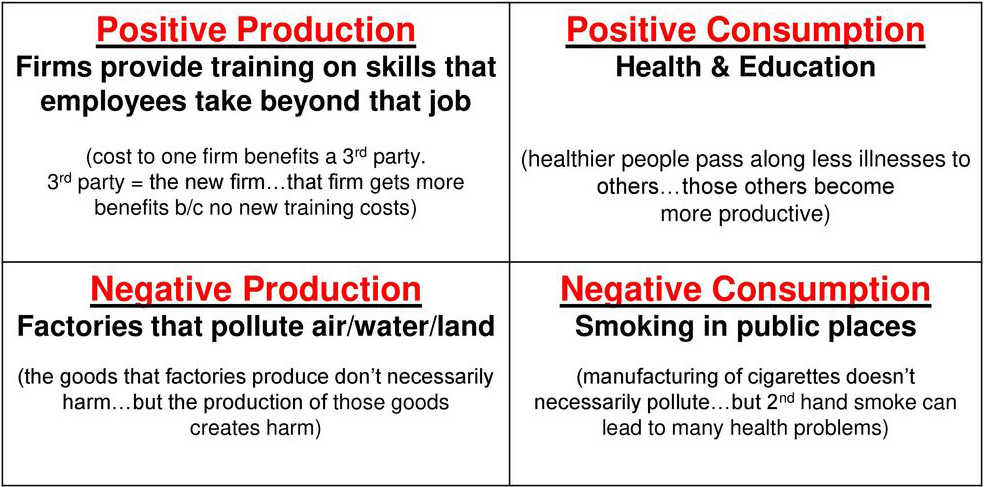Activity 3d – Externalities

Positive consumption externalities
A beautiful garden created by your neighbour:
The free market would tend to underallocate resources to this area of production.
When your neighbour constructs a beautiful garden then you have the ability to enjoy the benefits of this garden without having to pay your neighbour (at least the part that can be viewed from the street). The free market, in this case, doesn’t concern itself with the production of beautiful gardens and some people won’t bother maintaining their garden. This might be the case if the resident is renting the property because there is little incentive to invest in plants and landscaping.
Positive production externalities
Rand D by Apple.
Research and development is the process by which companies utilise some of their revenue to investigate the validity of new ideas and then spend time trialing different versions of the product until it can be released to the public. The research conducted by Apple so that it can develop new and more technologically advanced products has a positive impact on all those who use the products. In addition, other technology companies will be able to pull apart the Apple products to learn how they made their products better (without having to pay them). The free market will tend to underprovide research and development because it is inherently risky and there is no guarantee that the efforts will come to fruition. The recipients of the positive externalities are also not forced to pay for them so the full value to society is not captured in the price that Apple (or any other company) pays for the research and development
Negative consumption externalities
Your neighbour’s fireplace
When a person burns wood in their fireplace, they impose costs on their neighbours which they are generally not forced to pay for. The neighbour’s enjoyment of life is reduced and they may experience breathing and/or other health-related problem, which may mean that they have to pay for through increased medical bills. Therefore, the incentive to reduce pollution is unlikely to be determined in the market and the production of heat using wood-based fireplaces is above what would be considered socially optimal.
Negative production externalities
The building of a road using a jackhammer.
Production using a jackhammer leads to a cost being imposed upon third parties, such as those who live near the roadworks as they are subject to noise pollution. If they are working from home, or their workplace is near where the work is taking place, the noise may distract them from their work, reducing productivity and imposing a cost on the employee and their business In a free market the producer only considers the private costs and is not forced to pay for the costs imposed on society. This means that they tend to over allocate resources and society’s wellbeing is therefore not maximised.
